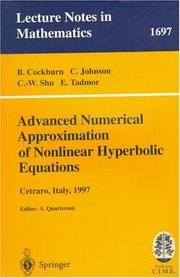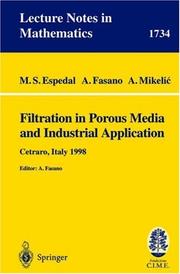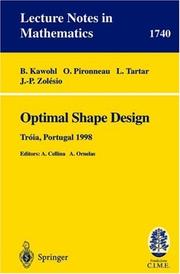| Listing 1 - 3 of 3 |
Sort by
|

ISBN: 3540649778 3540498044 9783540649779 Year: 1998 Volume: 1697 Publisher: Berlin ; Heidelberg ; New York Springer Verlag
Abstract | Keywords | Export | Availability | Bookmark
 Loading...
Loading...Choose an application
- Reference Manager
- EndNote
- RefWorks (Direct export to RefWorks)
This volume contains the texts of the four series of lectures presented by B.Cockburn, C.Johnson, C.W. Shu and E.Tadmor at a C.I.M.E. Summer School. It is aimed at providing a comprehensive and up-to-date presentation of numerical methods which are nowadays used to solve nonlinear partial differential equations of hyperbolic type, developing shock discontinuities. The most effective methodologies in the framework of finite elements, finite differences, finite volumes spectral methods and kinetic methods, are addressed, in particular high-order shock capturing techniques, discontinuous Galerkin methods, adaptive techniques based upon a-posteriori error analysis.
Differential equations, Hyperbolic --- Differential equations, Nonlinear --- Numerical solutions --- Congresses --- Differential equations [Hyperbolic] --- Differential equations [Nonlinear ] --- Partial differential equations. --- Numerical analysis. --- Thermodynamics. --- Computational intelligence. --- Partial Differential Equations. --- Numerical Analysis. --- Computational Intelligence. --- Chemistry, Physical and theoretical --- Dynamics --- Mechanics --- Physics --- Heat --- Heat-engines --- Quantum theory --- Mathematical analysis --- Partial differential equations --- Intelligence, Computational --- Artificial intelligence --- Soft computing --- Differential equations, Hyperbolic - Numerical solutions - Congresses --- Differential equations, Nonlinear - Numerical solutions - Congresses

ISBN: 3540678689 3540446567 9783540678687 Year: 2000 Volume: 1734 Publisher: Berlin ; Heidelberg ; new York Springer Verlag
Abstract | Keywords | Export | Availability | Bookmark
 Loading...
Loading...Choose an application
- Reference Manager
- EndNote
- RefWorks (Direct export to RefWorks)
This book is devoted to the presentation of some flow problems in porous media having relevant industrial applications. The main topics covered are: the manufacturing of composite materials, the espresso coffee brewing process, the filtration of liquids through diapers, various questions about flow problems in oil reservoirs and the theory of homogenization. The aim is to show that filtration problems arising in very practical industrial context exhibit interesting and highly nontrivial mathematical aspects. Thus the style of the book is mathematically rigorous, but specifically oriented towards applications, so that it is intended for both applied mathematicians and researchers in various areas of technological interest. The reader is required to have a good knowledge of the classical theory of PDE and basic functional analysis.
Filters and filtration --- Fluid dynamics --- Porous materials --- Industrial applications --- Mathematical models --- Mathematical Theory --- Applied Mathematics --- Engineering & Applied Sciences --- Mathematics --- Physical Sciences & Mathematics --- Congresses --- Condensed matter. --- Partial differential equations. --- Thermodynamics. --- Mechanics. --- Applied mathematics. --- Engineering mathematics. --- Condensed Matter Physics. --- Partial Differential Equations. --- Classical Mechanics. --- Applications of Mathematics. --- Engineering --- Engineering analysis --- Mathematical analysis --- Classical mechanics --- Newtonian mechanics --- Physics --- Dynamics --- Quantum theory --- Chemistry, Physical and theoretical --- Mechanics --- Heat --- Heat-engines --- Partial differential equations --- Condensed materials --- Condensed media --- Condensed phase --- Materials, Condensed --- Media, Condensed --- Phase, Condensed --- Liquids --- Matter --- Solids --- Fluid dynamics - Congresses. --- Filters and filtration - Mathematical models - Congresses. --- Filters and filtration - Industrial applications - Congresses. --- Porous materials - Congresses.

ISBN: 3540679715 3540444866 9783540679714 Year: 2000 Volume: 1740 Publisher: New York Springer
Abstract | Keywords | Export | Availability | Bookmark
 Loading...
Loading...Choose an application
- Reference Manager
- EndNote
- RefWorks (Direct export to RefWorks)
Optimal Shape Design is concerned with the optimization of some performance criterion dependent (besides the constraints of the problem) on the "shape" of some region. The main topics covered are: the optimal design of a geometrical object, for instance a wing, moving in a fluid; the optimal shape of a region (a harbor), given suitable constraints on the size of the entrance to the harbor, subject to incoming waves; the optimal design of some electrical device subject to constraints on the performance. The aim is to show that Optimal Shape Design, besides its interesting industrial applications, possesses nontrivial mathematical aspects. The main theoretical tools developed here are the homogenization method and domain variations in PDE. The style is mathematically rigorous, but specifically oriented towards applications, and it is intended for both pure and applied mathematicians. The reader is required to know classical PDE theory and basic functional analysis.
Mathematical optimization. --- Structural optimization --- Mathematics. --- Mathematical optimization --- Optimalisation mathématique --- Wiskundige optimisatie --- Mathematics --- Structural optimization - Mathematics. --- Mathematical analysis. --- Analysis (Mathematics). --- Calculus of variations. --- Analysis. --- Calculus of Variations and Optimal Control; Optimization. --- Isoperimetrical problems --- Variations, Calculus of --- Maxima and minima --- 517.1 Mathematical analysis --- Mathematical analysis
| Listing 1 - 3 of 3 |
Sort by
|

 Search
Search Feedback
Feedback About UniCat
About UniCat  Help
Help News
News